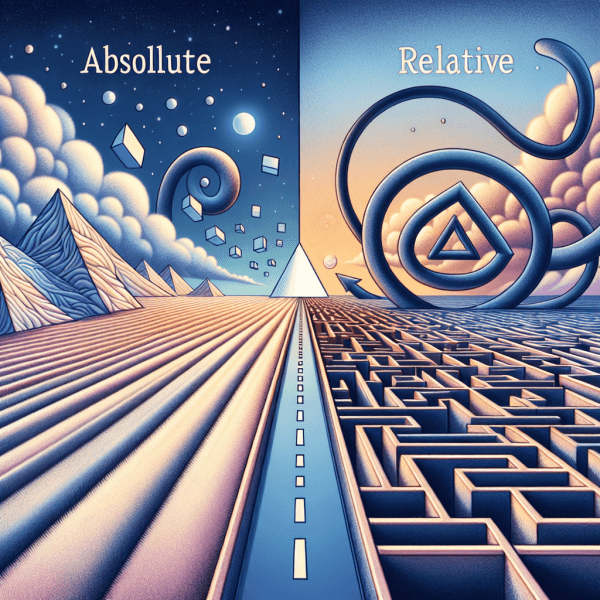The English language is rich and nuanced, often employing terms that, upon first glance, may seem synonymous yet actually encapsulate different meanings and usages. Two such terms are absolute and relative. This essay aims to explore these words in detail, their definitions, contexts, and examples to elucidate their distinctions.
Definitions
Absolute
The term absolute refers to something that is not dependent on anything else; it stands alone and is often regarded as independent of external conditions or contexts. In various fields, such as philosophy, mathematics, and linguistics, the concept of absoluteness embodies notions of unqualified existence or universality.
Relative
In contrast, relative denotes something that is dependent on or compared to something else. It emphasizes the idea of relationality and context, indicating that the meaning, value, or existence of something can change depending on its relationship with other entities.

Contrast in Contexts
Philosophical Context
In philosophy, the distinction between absolute and relative often pertains to values, truths, or morals. Absolute truths are viewed as universal and unchanging—for example, the assertion that "2 + 2 = 4" is a mathematical absolute. Conversely, cultural or moral relativism posits that beliefs and ethics can vary widely depending on societal context, making moral judgments relative.
Absolute Truth: "All humans are equal under the law."
Relative Truth: "What is considered 'just' can vary between cultures."
Scientific Context
In the sciences, absolutes are often linked with fixed quantities or constants, such as the speed of light in a vacuum, which is an absolute measure. In contrast, relative measures are used in physics, such as the concept of relative velocity, which depends on the frame of reference of the observer.
Absolute Measurement: "The boiling point of water is 100°C at standard atmospheric pressure."
Relative Measurement: "The speed of an object is 60 km/h relative to the ground."
Linguistic Context
From a linguistic standpoint, the terms can be applied to language structures. An absolute phrase provides additional information without altering the main clause of a sentence, while a relative clause depends on a noun to provide context, often beginning with relative pronouns like "who," "which," or "that."
Absolute Phrase: "His mind racing, he answered the question."
Relative Clause: "The book that I borrowed is fascinating."
Conclusion
The distinction between absolute and relative illuminates how language and concepts function within various domains. An understanding of these terms enhances clarity in communication and discourse, as it delineates when something is independent versus when it is contingent upon context. Appreciating the nuances these words convey can lead to more profound insights in discussions of philosophy, science, and daily conversation.








Have a discussion about this article with the community:
Report Comment
We're doing our best to make sure our content is useful, accurate and safe.
If by any chance you spot an inappropriate comment while navigating through our website please use this form to let us know, and we'll take care of it shortly.
Attachment
You need to be logged in to favorite.
Log In